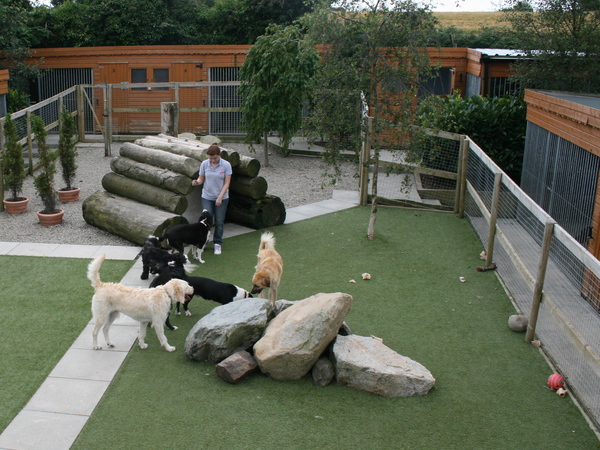Dog kennels near me: choosing the right boarding for your dog
Finding the right boarding kennel for a dog is a huge step for any family planning a holiday. This guide covers everything from checking a kennel's clean and secure to verifying its licence. Learn how to choose a kennel that meets your dog’s needs, and discover alternatives to traditional kennel boarding, such as home boarding or professional dog sitters.
Step-by-step guide to finding a licensed kennel near you
Follow our guide below to navigate through the process of selecting the best boarding kennel for your dog.
Step 1: Gather recommendations
Start by speaking to dog owners you know and trust — and your vet — to get recommendations for reputable local dog kennels.
Step 2: Use online directories
If personal recommendations are limited, you could try visiting some online directories dedicated to dog boarding such as the Association of Dog Boarders or the British Kennels website. These not only list various kennels but often include user reviews and certification details.
Step 3: Check online reviews
Once you've narrowed down your choices, visit review platforms like Google, Yelp, and TrustPilot. Reviews from other dog owners can provide insights into the kennel’s reputation and quality of care.
Step 4: Verify the kennel's licence
Next check the dog kennels you've chosen is licensed. You can do this either by visiting the kennel's website, calling them up and asking to see the licence, or by searching for animal boarding on your local council's website, which you can find by entering your postcode at find your local council. Many councils, but not all, publish a public register of licensed kennels.
Remember, a reputable kennel will be transparent about their licensing status. Make sure it hasn't expired and also check the name and address match the kennel in question.
This licence ensures the dog boarding kennel meets stringent standards for hygiene and safety. Since 2018, statutory guidance for local authorities in England require animal boarding licences to include a detailed star rating and the duration for which the licence is valid. Ideally, opt for facilities that boast at least a three-star rating. You can find the Scottish regulations for animal welfare at this link.
Step 5: Visit potential kennels
Once you've shortlisted two or three kennels, book visits to inspect the facilities firsthand. Ensure that the kennel is clean, well-maintained, and well-ventilated. You should also check that the facility is secure, with measures such as CCTV, secured entry points, and safe, enclosed exercise areas to prevent escapes.
Check that dogs have adequate space to move, play, and rest, and that the kennels aren't overly crowded. You might also want to make sure there's plenty of stimulating activities and toys to keep dogs engaged.
Step 6: Book your spot
Once you're happy with the kennel’s reputation, facilities, and licence status, book a spot for your dog. Just make sure you understand all the terms and conditions, especially regarding cancellations and extra charges.

Outdoor area at a dog boarding kennel (photo by K Tiernan)
Read more: Tips for choosing your cat's boarding place
What kennels must do to get a dog boarding licence
| Section | Description |
|---|---|
| Licensing requirements | All commercial dog boarding activities need a licence. Criteria include adhering to local government guidelines and ensuring staff qualifications meet required standards. |
| Minimum standards | Facilities must maintain basic welfare standards including sufficient space and emergency protocols. |
| Higher standards | Achieving a 4 or 5-star rating and a longer licence duration requires exceeding basic care requirements and ensuring superior comfort and safety measures. |
| General conditions | The licence must be prominently displayed. Conditions include limits on the number of dogs to prevent overcrowding and ensure individual attention. |
| Staff competence | Staff should be trained to recognise signs of distress in dogs and manage behavioural issues professionally. |
| Environment and housing | Facilities must be secure, clean, and safe, with adequate space, lighting, and ventilation. |
| Diet and health | Dogs must be fed according to their needs and have constant access to clean water. Health checks and dog vaccinations are essential. |
| Emergency procedures | Detailed plans must be in place for emergencies such as fires or medical incidents. This includes evacuation procedures and on-site first aid readiness. |
Questions to ask before choosing a kennel
- What will my dog’s daily routine be like?
- How do you handle medical emergencies?
- What types of exercise and play are available?
- Can I provide my dog’s regular food?
- What vaccinations do you require?
- How many staff will interact with my dog?
- How do you manage dogs with special needs or behavior issues?
- What is the cost of boarding?
Read more: What dog breeds are banned in the UK?
Before going on holiday
Ensure the kennel has your contact information, your vet’s details, and any special instructions regarding your dog’s care. You might even want to consider a trial overnight stay or daytime visit to help your dog get used to the kennels.
Alternatives to using boarding kennels
There are several alternatives to dog boarding kennels that might better suit your pet's needs. These include:
Family or friends
Asking a friend or family member to care for your dog while you're away is often the most cost-effective solution. It's particularly beneficial if your dog knows the person well.
Professional dog sitters
Professional dog sitters often look after your dog at their own home. They provide personalised care, regular updates, and make sure that your dog’s routine is maintained.
Home boarding
Home boarding allows your dog to stay in someone's home. It usually provides more individual attention and interaction, making it a great option for dogs that are used to living indoors and being around people.
House sitting
House sitting involves a sitter staying at your home. This allows your dog to stay in their normal environment, which can be comforting for your pet and ensures all their needs are met in a familiar setting.
For more information on these alternatives, you may consider visiting the following websites:
- BorrowMyDoggy for finding dog holiday care
- Barking Mad for home boarding services
- Trusted House Sitters for house sitting options
Read more: Animal health certificates, pet passports and taking dogs abroad
Needing advice on local dog kennels?
For expert advice on choosing the right boarding kennel, just contact your local vet.
Find your nearest vet using our find a vet page, or speak to a vet online using online vets.


